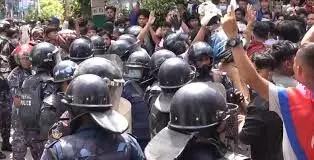Nepal Foreign Minister Arzu Deuba Attacked in Violent Protests Over Corruption
A report on the escalating political crisis in Nepal, where violent protests have led to a shocking attack on Foreign Minister Arzu Rana Deuba. The unrest, fueled by widespread anger over corruption, nepotism, and a recent social media ban, is described as the most violent the country has seen in decades.
A protest in Kathmandu turns violent as anger over corruption and social media bans escalates.

A startling video from Nepal shows a mob physically attacking Foreign Minister Arzu Rana Deuba amid a wave of violent protests. The video, which has gone viral online, shows Deuba, 63, getting punched and kicked after protesters broke into her home. The incident serves as a clear representation of the mounting hostility and discontent towards Nepal's political establishment.
At least 21 people have died and more than 300 have been injured as a result of the violent protests, which are mostly being led by "Gen Z" youth. Public outrage over corruption, nepotism, and a recent social media ban is heightened by the protests.
Social Media Bans and Public Outrage Drive Protests
After the Nepali government blocked Facebook, YouTube, and X, among other social media sites, the unrest grew more intense. This decision came after a social media campaign, especially on TikTok, that showed how politicians' kids led extravagant lives that contrasted sharply with the nation's average annual income of only $1,400. With signs that read, "Shut down corruption and not social media," protesters voiced their displeasure with the obvious display of wealth by people they refer to as "Nepo Babies."
Images from Kathmandu, the capital, depict a tumultuous scene with young demonstrators engaged in fierce combat with police. The current unrest is being described as the most violent the country has seen in decades, surpassing even the 2006 uprising that led to the end of the monarchy. The attack on a high-ranking official like the Foreign Minister underscores the depth of the public’s anger and the escalating political crisis in Nepal.

